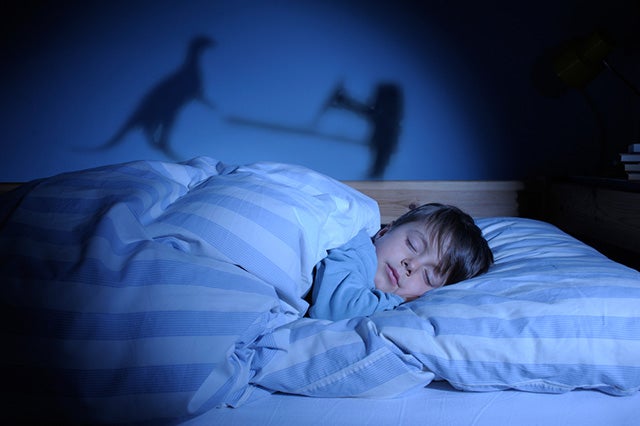Did you know that you can only dream about faces you’ve seen before? Or that part of your brain shuts down when you’re dreaming, which is why dreams can be strange? We discovered a lot about dreams in the past decades.
How long do dreams last, what types of dreams people have, and other interesting dream-related facts in this article!
How Long Is a Dream?
According to estimates, researchers say people spend about two hours dreaming each night. The REM sleep phases that occur early in the night typically last around ten minutes. Still, as the night progresses, their length steadily increases, reaching a maximum of roughly an hour.
Even so, it is difficult to tell whether these periods coincide with the actual length of dreams, especially considering that not all dreams occur during REM sleep. This makes it difficult to determine whether these times match the actual length of dreams.
Research on dream content depends on the participant’s self-reporting, which can be an inaccurate data source. Additionally, upon waking, some people have trouble recalling the details of their dreams.
Because of this gap in recollection, it is difficult for researchers to estimate each dream’s length precisely or to determine whether or not the length of a dream as it is remembered corresponds to the time that the dream truly lasted.
Why Do Dreams Feel So Long?
Several hypotheses explain why people frequently assume that their dreams last for much longer than they actually do.
Since our brain has a lower temperature when we’re in the REM sleep stage, one idea proposes that brain activity might be slower during this stage of sleep. Therefore, the dreamer would experience a more leisurely progression of dream scenery.
There is also the idea that the brain is aware that certain acts should involve more effort than others, even though most of the body’s muscles are immobilized during REM sleep. Because the muscles do not provide any input, the brain simulates physical exertion by devoting more attention to activities it perceives as taxing.
How Do Dreams Work?
Dreams are a lot more complex than you think. The best way to start talking about how dreams work is to talk about the four sleep stages.
Stage 1
During the first phase, you slowly start falling asleep. Your brain is not as active, your body relaxes, you may experience muscle twitching, and your heartbeat slows down. This stage lasts around 10 minutes.
Stage 2
As you pass the second sleep stage, you lose connection with your surroundings, your eyes stop moving, and your body temperature drops. The second sleep stage lasts around 20 minutes.
Your brain patterns also change, showing signs of rhythmic brain activity. They help consolidate memory, and you remember the things you learned the day before.
Stage 3
In the third sleep stage, you are in a deeper sleep. Your body is relaxed, your breathing slows down, and you experience a drop in blood pressure.
REM Sleep
The most complex sleep stage is rapid eye movements, also known as REM sleep. During REM sleep, your brain experiences a lot of activity, even if your body is immobilized. You breathe faster, have rapid eye movement, and experience dreams.
Different Types of Dreams
Dreams can be labeled into one of the following seven categories.
Daydreams
Daydreaming is when your mind wanders off into a train of ideas that distract your attention from the present moment and makes you less aware of your environment.
The default mode network in the brain is responsible for inducing daydreaming when there is an insufficient external stimulus to keep it active. This causes us to daydream while we are awake. Daydreaming can be characterized by various subtypes, including dysphoric, escape, visualization, or fantasy.
Lucid Dreams
In these dreams, the person having the lucid dream knows they are dreaming and can maintain some control over their body and mind during the process.
Prophetic Dreams
People can see future events occurring in their dreams before they take place in real life. Some people think that having a prophetic dream means that the dreamer has successfully foreseen the future. In contrast, others think that having a prophetic dream is your subconscious trying to prepare you for something about to happen.
False-Awakening Dreams
When false-awakening dreams occur, the person dreaming thinks they’ve woken up while still in the middle of the dream. They offer a hybrid state of sleep and wakefulness and are often linked to sleep paralysis or lucid dreaming.
Healing Dreams
When the dreamer can heal others or possesses a supernatural talent such as telepathy or telekinesis is known as healing dreams. Therapeutic dreams might bring about feelings of equilibrium and reconciliation. They have the potential to assist you in achieving a sense of calm or direction by working with your subconscious mind.
Recurring Dreams
The term “recurring dreams” refers to the dreams we repeatedly have during a single sleep session or across numerous sleep sessions. Repeated dreams sometimes take the form of recurring nightmares. They contain the same or comparable sensations and visuals as previous instances of the dream.
Several schools contend that recurrent dreams are caused by a person’s attempt to avoid uncomfortable situations, internalized phobias, or other unresolved difficulties.
Nightmares
Fear-provoking dreams are known as nightmares. When you have a nightmare, know that it’s the brain’s way of processing the various stresses encountered throughout the day.
Nightmares can be brought on by several factors, including poor eating habits, a history of traumatic experiences, illness, insufficient sleep, medication you might be taking, or certain sleep disorders.
How Long Do Nightmares Last?
Since nightmares are technically dreams, they also last as long as a dream. So, if a dream lasts around 20 to 30 minutes, a nightmare can also be that long.
Are Nightmares and Dreams the Same?
Technically, yes. Dreams encompass both good and bad, so nightmares are also dreams. They are just the scary and stressful side of dreaming.
How Many Dreams Do We Have Each Night?
The number of dreams you have per night depends on how much sleep you get, therefore, how many full sleep cycles you go through. People usually have at least four dreams per night, with others having up to seven.
Final Thoughts
Everyone has their own unique set of dreams. A possibility is that dream recollection is rare for you. Alternatively, you may become aware of a particularly vivid memory upon waking.
However, if you get enough shut-eye, you will dream at different times during the night. All this is is your mind working on a process every night toward an undefined end.
But you should see a doctor if your nightmares become more frequent. Possible medical causes for your dreams should be investigated.
Photo credit: oOhyperblaster/Shutterstock;
New Africa/Shutterstock; fizkes/Shutterstock;
granata68/Shutterstock; Yuganov Konstantin/Shutterstock;
Golden Dayz/Shutterstock; K Petro/Shutterstock;
Antonio Guillem/Shutterstock; sezer66/Shutterstock;
lassedesignen/Shutterstock
Frequently Asked Questions
Do kids dream the same as adults?
Kids' dreams are different compared to those of adults. They mostly reflect emotional family interactions, friends, or things that scare them.
Do babies dream?
Sadly, science has yet to establish if babies dream or not. Even if you notice your baby's eyelids moving or their legs twitching while they're asleep, this is pretty normal in certain sleep stages and doesn't tell us whether the baby is dreaming or not.
Do animals dream?
Animals have similar sleeping patterns to humans, so many of them can also dream. There's still a ton to learn about animal dreaming since they can't tell us if and what they dreamt when they woke up.









